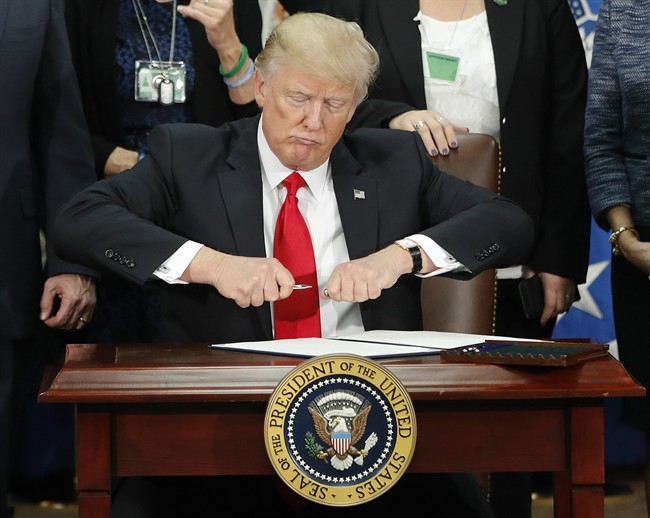President Donald Trump has had a busy five days since his inauguration, putting his signature on — at last count — about 10 executive actions designed to push his agenda forward.

The memorandums and orders have involved everything from abortion funding to pipelines, and Trump added to the tally on Wednesday with new actions focused on border security and immigration.
READ MORE: How the U.S. Congress can derail a presidency, no matter who wins
At least one expert calls the pace of executive actions signed in the first week of this presidency “staggering.”
“I think Trump is trying to remind his base, or at least convince his base, that he was serious about the commitments he made on the campaign trail,” said Donald Abelson, professor and chair in the department of political science at the University of Western Ontario.
“What he hasn’t quite figured out yet is that his role is not to simply appease his base; it’s to bridge this enormous divide in the country.”
But how much of an impact will Trump’s executive actions — which are directives issued by the president that have the full force of the law — really have on policy?
The answer, at least for this first flurry of pen-strokes, is ‘not much.’
READ MORE: Trump says construction on border wall will start as soon as ‘we can physically do it’
“Whether or not all of these executive orders end up translating into law, into concrete public policies, we’ll have to wait and see,” Abelson confirmed.
More bark than bite?
The first executive order Trump signed, for instance, directed the secretary of health and human services, as well as other federal agencies, to interpret regulations as loosely as possible to minimize the Affordable Care Act’s (Obamacare) financial burden on individuals, insurers, health care providers and others.
The order repeatedly included the caveat “to the maximum extent permitted by law.” While it sent a clear message about the new administration’s priorities, Trump can’t unilaterally repeal Obamacare without support from Congress.
WATCH: Trump ready to block immigrants from 7 countries

Similarly, an order from Trump to speed up environmental reviews of infrastructure projects won’t have much affect. Those reviews are enshrined in legislation that can’t just be cancelled by an executive order. Trump likely knows this; his order on the Dakota Access Pipeline directs the Army Corps of Engineers to “review and approve in an expedited manner, to the extent permitted by law.”
As for the presidential memorandum formally withdrawing the U.S. from the Trans-Pacific Partnership, it was simply unnecessary. The U.S. hadn’t formally signed on to the trade deal in the first place.
An order requiring NGOs that receive federal funding to agree to “neither perform nor actively promote abortion as a method of family planning in other nations” could have a real impact, however.
If Trump decides to get more heavy handed with orders that actually do carry significant policy weight, said Abelson, they could be challenged as unconstitutional in court (this was floated as a possibility for any ban of Muslims coming to the United States) or successfully overturned by two-thirds of Congress.
“When you start seeing executive orders that deal with highly controversial issues, we can’t take it as a given that they will stand the test of time,” he said.
“(Trump) has the luxury of being able to rely on a Republican-controlled Congress, but that doesn’t mean that everything he proposes will be adopted, because members of Congress, including Republicans, owe their allegiance not to Donald Trump, but to the people who put them in office.”
WATCH: Donald Trump announces executive order to build Mexico border wall

Trump’s actions in his first week are those of a veteran businessman who wants immediate results, Abelson noted, but a lot of what has been signed is “symbolic.”
“Just because he issues an executive order to build a wall along America’s southern border, doesn’t mean that Congress is going to set aside in its budget sufficient funds to make that possible,” he said.
“At the end of the day, he’s going to require congressional support on many of the orders that he’s issuing.”
Even if Trump’s effort to use his executive authority fail, however, he’ll still be able to blame Congress, the media or even the public for those failures.
“This is kind of his ‘can-do’ spirit,” Abelson said. “He’ll worry about the details later.”


Comments